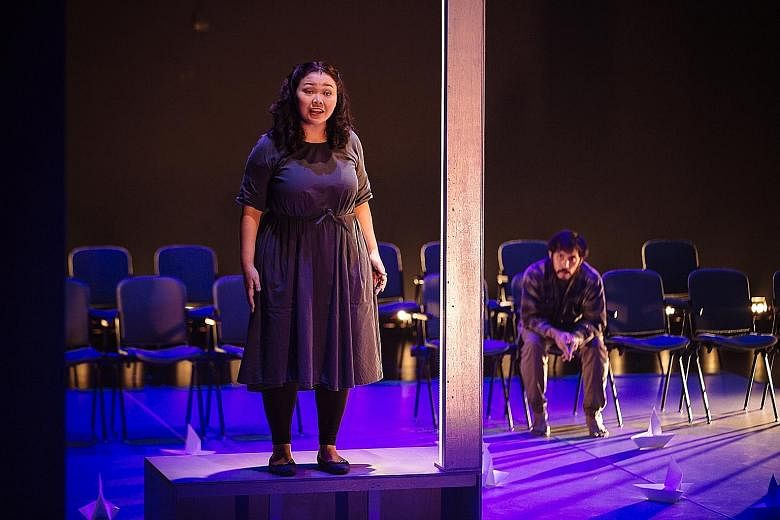Actress Siti Khalijah Zainal is a star so bright, she can draw full-house crowds on her own steam, as she did for this revival of Cultural Medallion recipient Haresh Sharma's 1995 one-woman play.
Sharma debuted Rosnah as a piece of community theatre at the Tampines Regional Library that same year, sketching the character as a Singaporean overachiever off to London to study mass communications.
Arriving there, she squats with the man-hungry Muslinda and is saved from attacking pigeons by an older, non-Muslim student, who becomes her live-in lover. She returns home with him, with devastating consequences.
Siti was reprising this long-loved play that she first took on in 2006.
In a nifty passing of the baton, fellow thespian Aidli "Alin" Mosbit, the original Rosnah, translated Sharma's mostly-English play into the Malay language for this run. So Siti performed it mostly in Malay for the first time, which gave her lines added piquancy.
-
REVIEW / THEATRE
-
ROSNAH
The Necessary Stage
Esplanade Theatre Studio/Last Friday
In 60 minutes, she was required to be herself, as a sort of narrator, flesh out Rosnah, and bring to life Rosnah's grandmother, parents, brother, Caucasian lover Stephen, Muslinda and Siti Zubaidah, a gutsy Mulan-like woman warrior.
The last two, and Rosnah's granny, represented the different facets of Malay-Muslim women.
Could she inhabit all these characters convincingly? Good question.
In answer, Siti decided to be true to herself, with rib-tickling, if befuddling, results.
That was because Siti as Siti was the lovable, worldly and sophisticated Singaporean that Rosnah hoped to, but could not, be because of low self-esteem and her resultant frumpy ways. But both were essentially winsome, so when exactly was Siti speaking as Rosnah, and when as herself? It was often hard to tell, and director Alvin Tan, also a Cultural Medallion recipient, would have done well to get Siti to assert Rosnah more forcefully.
In Sharma's 1995 manuscript, available on microfilm from the National Library Board, Rosnah takes pity on a British beggar who corners her for spare change and makes two sandwiches for him. But in this evening's incarnation of Rosnah, Siti was made to lash out at the straggler and his Western ilk for tarring all Muslims with the steamrolling label of terrorism.
The terrorism motif, which was not in the original script, was a smart way to update the play. But the work was dated, nonetheless, because its other cultural references - Christian Slater and Michael Bolton, among these - remained unchanged.
Unalloyed beauty throughout came from musician and sound designer Bani Haykal, who performed his songs of sweet melancholia to shape moments of intimacy and dejection. Siti cooed his lyrics, lending even more light to the music, which had the same fretless vibes as the soundtrack to the 2013 movie Begin Again.
All told, this revised revival was a mellow, if unsatisfying, confection.


